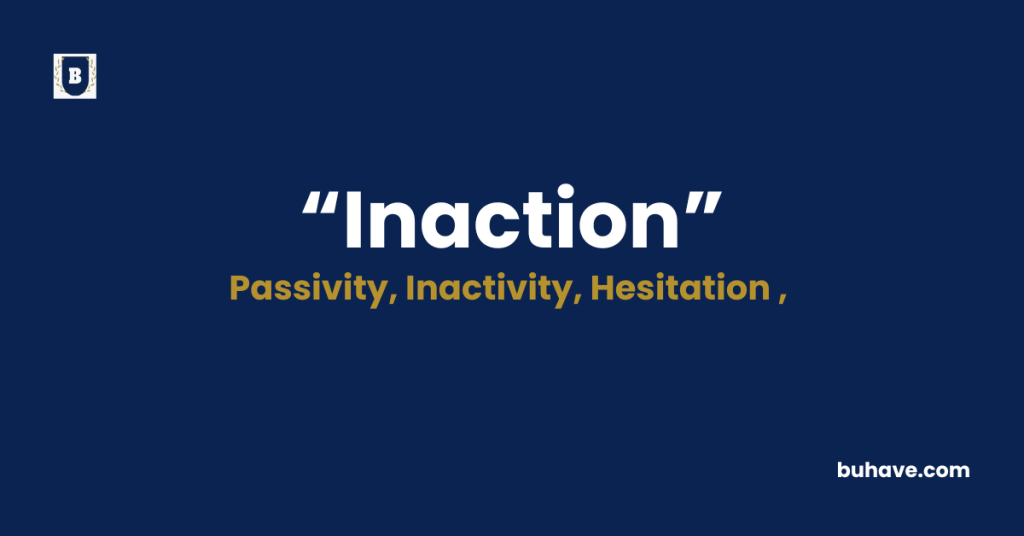The word Inaction (Noun) refers to a lack of action, effort, or response, especially when some form of action is expected or needed. In this guide, you’ll learn the full definition, synonyms, antonyms, etymology, and real-life examples of how to use Inaction correctly in sentences.
Inaction Explained in Depth
A complete and detailed guide to the word Inaction including meaning, definition, examples, etymology, synonyms, and antonyms.
Meanings of Inaction
Inaction means the state of doing nothing or failing to take any steps, especially in situations that require a response. It can imply hesitation, indifference, or paralysis in the face of challenges or decisions.
Definition
Inaction refers to the absence of activity, movement, or initiative when action is expected. It can result from fear, indecision, passivity, or a deliberate choice to wait. In some cases, inaction stems from a lack of awareness or understanding. In other cases, it may reflect apathy or resignation. Politically and socially, inaction is often criticized when it leads to missed opportunities or unresolved problems. For example, government inaction during a crisis may cause public frustration or harm. On a personal level, inaction can delay goals, hinder progress, or increase regret.
While sometimes necessary for reflection or caution, prolonged inaction may weaken momentum, allowing external forces to take control. Understanding the reasons behind inaction can help individuals and groups respond more effectively in the future.
Etymology
The word “inaction” originates from the Latin prefix in- meaning “not” and actio meaning “a doing, a driving force, or movement.” It entered the English language in the early 17th century. The word first appeared in philosophical and political writings, where thinkers analyzed the consequences of failing to act. Over time, it became common in discussions about leadership, crisis management, and emotional behavior. Inaction now appears in literature, media, and academic studies to highlight consequences of delayed or absent response. Its historical roots emphasize the human need to balance action with restraint and to avoid stagnation in critical situations.
Example Sentences
- The team’s inaction during the emergency worsened the situation.
- Long-term inaction on climate change has drawn global concern.
- He regretted his inaction when he had the chance to speak up.
Inaction Synonyms
- Immobility
- Inertia
- Passivity
- Neglect
- Stagnation
- Stillness
- Lethargy
- Silence
- Delay
- Disengagement
Inaction Antonyms
- Action
- Movement
- Initiative
- Engagement
- Effort
- Participation
- Response
- Change
- Leadership
- Involvement
FAQs about Inaction
Here are some frequently asked questions (FAQs) about the word “Inaction”
1. What does inaction mean?
It refers to doing nothing or failing to respond when action is expected.
2. Is inaction always negative?
No. Sometimes, waiting or observing before acting is wise, but long-term inaction often has drawbacks.
3. What are some causes of inaction?
Fear, doubt, uncertainty, low motivation, or lack of direction can all lead to inaction.
4. How does inaction affect decision-making?
It can delay outcomes, reduce control over a situation, or lead to missed opportunities.
5. Can inaction be a form of communication?
Yes. In some cases, inaction can signal resistance, disapproval, or intentional silence.

















